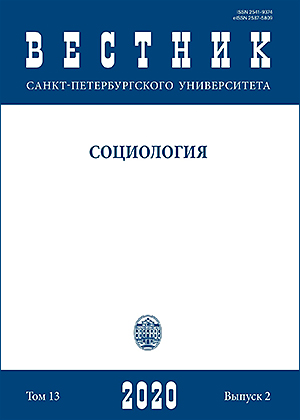Trust in a digital society
DOI:
https://doi.org/10.21638/spbu12.2020.202Abstract
What is a digital society? How does trust work in this new digital world? What is its difference compared to previous types of trust? All of these issues are in the very focus of this article. The first part of the paper shows how sociologists characterize a digital society, which makes it fundamentally different from an industrial and postindustrial ones. A characteristic feature of digitalization is its comprehensiveness. All spheres of activity, individual and collective, are
being organized in a new technological way. It is demonstrated that the most important effect of digitalization is a fundamental change in the structure of social time in terms of costs and benefits. The second part of the paper describes the processes of transformation of trust: from patriarchal and personal trust to impersonal, role-based and institutional trust; then to network type trust and digital trust. The digital world expands our capabilities and changes the functioning of trust in social and economic life. The radius of trust is expanding significantly and the number of social ties is growing, although they are becoming weaker, shorter, more fragile, and remote. Functionally in the economy, digital trust reduces transaction costs (exchange costs); and in the social world — the costs of social interaction. The third part deals with trust issues in the digital world of Russia. Russia occupies the second to last place in the
rankings of the 2019 Digital Society Index. Russians believe that their basic digital needs (access to digital content and trust in information) are not adequately satisfied; they believe that the digital world does not serve to improve society and that the digital world will not provide them with career opportunities. Trust in the digital world is not expanding in Russia also due to digital illiteracy. It is ironic that with this low trust in digital technologies, the scale of their use by Russians is expanding. This article is a detailed report for the St. Petersburg International Labor Forum (February 27–28, 2020)
Keywords:
trust, digital trust, interpersonal trust, network trust, digital society., digital society
Downloads
References
References
Downloads
Published
How to Cite
Issue
Section
License
Articles of "Vestnik of Saint Petersburg University. Sociology" are open access distributed under the terms of the License Agreement with Saint Petersburg State University, which permits to the authors unrestricted distribution and self-archiving free of charge.




